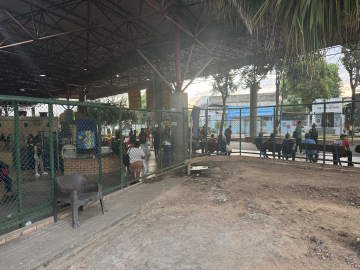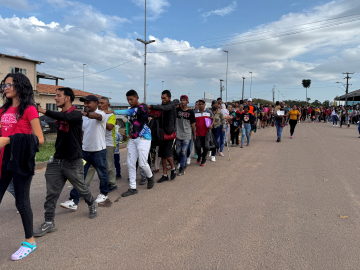Dispatches From Bogotà: ICFP 2025
Global Health NOW was honored to join the approximately 800 organizations, more than 50 governments, and 2,000 researchers, practitioners, and other experts gathered in Bogotà, Colombia, for the International Conference on Family Planning 2025—the first ever held in Latin America.
You'll find some conference takeaways below, including briefs on the state of family planning, the linkages between climate change and sexual and reproductive health rights (SRHR), efforts to expand the circle of partners and allies, and professional development resources. —Dayna Kerecman Myers
November 6, 2025
‘The Law Alone Is Not Protection’
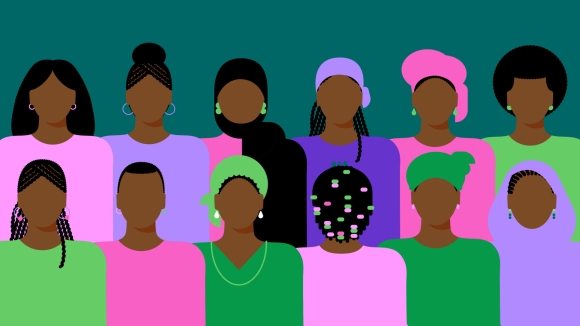
Illustration courtesy of Rutgers
Victim-survivors of sexual violence in West and Central Africa face a maze of barriers trying to obtain abortion care—even when the pregnancy resulted from rape or incest and when safe abortion is legally permitted, per a new study from Rutgers and CERRHUD released yesterday at the International Conference on Family Planning in Bogotà, Colombia.
- Every nine seconds in West and Central Africa, an unsafe abortion puts a woman’s life at risk.
- The study collected testimonies from women and girls who, after being raped, tried to end their pregnancies on their own, in five countries: Benin, Burkina Faso, Côte d’Ivoire, Togo, and Cameroon.
- Barriers include proof requirements that retraumatize, health workers uncertain on the law, procedural delays, and deep-rooted stigma.
“Behind every unsafe abortion we recorded was a story of fear, pressure or silence—never one of free choice. The law alone is not protection—that’s really clear in West and Central Africa and across the globe,” says lead researcher Jonna Both.
At a briefing yesterday at ICFP, leaders from MSI Reproductive Choices and Jacarandas joined the Rutgers researchers to discuss the global nature of the threat, especially as the U.S. budget cuts and policy changes under the Trump administration constrict access and could lead to more restrictions on countries around the world.
MSI’s Beth Schlacter warned attendees to be vigilant and prepare their countries for possible restrictions to be tied to future aid agreements with the U.S., and emphasized the need to fight for reproductive rights. “Even with all of the headwinds that we’ve seen … I think it’s important to recognize and talk about how many women are needing and requesting abortion care. This demand is not going away.”
A campaign for action: In response to the study findings, Rutgers is calling for governments to remove unnecessary barriers, improve resources for safe abortion care, and end stigma in health care systems.
November 5, 2025
On-Point Posters
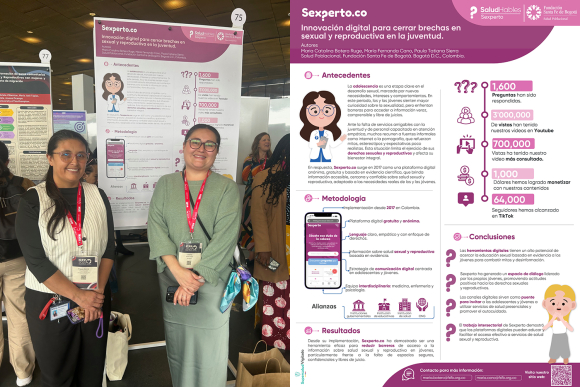
María Fernanda Cano (left) and Catalina Botero (right) pose with their poster at the ICPF conference. November 5, 2025, Bogotà, Colombia.
Sexperto.co is a Colombian digital platform where young people anonymously submit questions about sexual and reproductive health. A team of health professionals provides evidence-based, rights-focused answers in clear and accessible language. The platform has responded to 1,600+ questions and reaches millions through YouTube, TikTok, and other social media channels. The team behind Sexperto includes Catalina Botero, María Fernanda Cano, and Paula Sierra (not pictured in the photo); all work for the Population Health Department at Fundación Santa Fe de Bogotá.
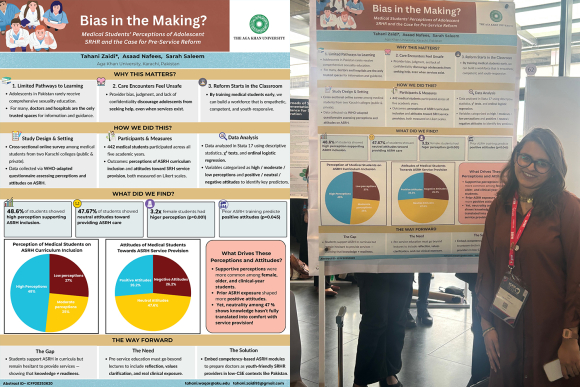
Tahani Zaidi, a public health researcher at Aga Khan University (and a 2025 ICFP Youth Trailblazer) from Karāchi, Pakistan poses with her poster on display at the ICPF conference. November 5, 2025, Bogotà, Colombia.
November 4, 2025
The Numbers
ICFP 2025 opened earlier this week with powerful new evidence that makes the case for family planning to not only save lives, but drive economic empowerment.
Here’s a snapshot of some takeaways from FP2030's Impact Report:
- Overall, the world has added 101 million more users of modern contraception since 2012, and demonstrated marked progress in expanding method choice, says FP2030's Jason Bremmer in a media briefing on the report.
- But: Not all countries have seen progress–and progress is threatened by the financing landscape for family planning, and more than 80% of the funding for family planning that spurred this progress has come from countries that have already announced aid cuts.
- New this year: This year’s report launches a key resource for Latin America and the Caribbean, with a new data aggregator observatory from the region.
Faith in Family Planning:
When Dina Chaerani was a child, her mother told her that she was made from flowers.
In Indonesia, where 98% of the population is Muslim, parents do not typically talk openly about sex with their children, and schools don't offer sex ed, Chaerani, a programme associate at the YIELD Hub, explains.
But now, she’s leading programs to incorporate Islamic values into sexual education programs for Indonesia, working with youth groups as well as religious leaders to incorporate the ILM Islamic principles and concept of masala, or collective well-being, in projects to promote reproductive justice.
Key lessons:
- Look for local connections; don’t frame it as a foreign idea.
- Bring a companion topic that is less controversial into education efforts; for example, she included lessons about nutrition and preventing stunting in a project to teach young mothers about reproductive health issues—and welcome fathers into the lessons.
Added bonus: Mothers and fathers share parenting more equally because they realize that fathers and mothers are both important, Chaerani says.
Fails for the win:
- A Johns Hopkins Center for Communication Programs session on normalizing failure provided a dose of professional development, featuring five panelists brave enough to share a work “fail,” and how they channeled it for growth.
- Barnabas Abok, deputy director, of the Women's Integrated Sexual Health (WISH 2) Project for the International Planned Parenthood Federation's Africa Regional Office, shared a time that a high-stakes project—with tough goals to meet in order to get paid—fell far behind in one country, requiring a two-week trip to the country to reframe with goals that made sense for the local context.
- Pro tip for managers: Abok added that his experience also helped him value strong, supportive leadership. He was grateful they didn’t fixate on the failure; instead, the pointed him in the right direction and asked him how we wanted to fix it.
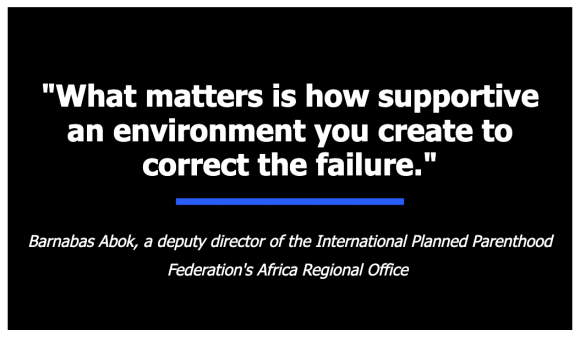
- CCP also shared pro tips, ideas, and resources—from hosting a “Fail Fest” (see Fail Forward for more info) to a CCP Learning from Failure module.
Image courtesy of ICFP.




